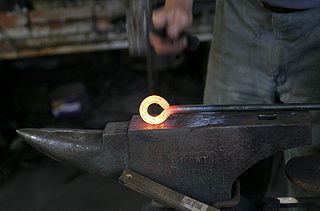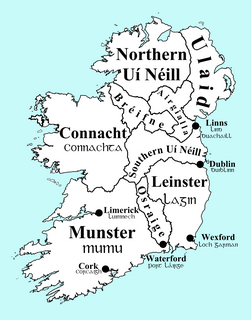Related Research Articles
MacLeod and McLeod are surnames in the English language.
The Scottish Renaissance was a mainly literary movement of the early to mid-20th century that can be seen as the Scottish version of modernism. It is sometimes referred to as the Scottish literary renaissance, although its influence went beyond literature into music, visual arts, and politics. The writers and artists of the Scottish Renaissance displayed a profound interest in both modern philosophy and technology, as well as incorporating folk influences, and a strong concern for the fate of Scotland's declining languages.

Smith is a surname originating in England. It is the most prevalent surname in the United Kingdom, Australia, Canada, New Zealand, and the United States, and the fifth most common surname in the Republic of Ireland. The surname Smith is particularly prevalent among those of English, Scottish, and Irish descent, but is also a common surname among African Americans, which can be attributed either to black slaves having been given the surname of their masters, or to being an occupational name, as some southern American black people took this surname to reflect their or their father's trade. 2,442,977 Americans shared the surname Smith at the time of the 2010 census, and more than 500,000 people shared it in the United Kingdom as of 2006. At the turn of the 20th century, the surname was sufficiently prevalent in England to have prompted the statement: "Common to every village in England, north, south, east, and west"; and sufficiently common on the (European) continent to be "common in most countries of Europe".

Iain Crichton Smith, was a Scottish poet and novelist, who wrote in both English and Gaelic.
A formal Gaelic language name consists of a given name and a surname. First names are either native or nativized. Surnames are generally patronymic, i.e. they refer to a historical ancestor. The form of a surname varies according to whether its bearer is male or female though for some surnames the adjectival form of a name such as Dòmhnallach can be used for both men and women. However, when used in the female form the first letter is lenited.
The Scottish Gaelic Renaissance is a continuing movement concerning the revival of the Scottish Gaelic language. Although the Scottish Gaelic language had been facing gradual decline in the number of speakers since the late 19th century, the number of young fluent Gaelic speakers is quickly rising. The movement has its origins in the Scottish Renaissance, especially in the work of Sorley MacLean, George Campbell Hay, Derick Thomson and Iain Crichton Smith. Sabhal Mòr Ostaig is sometimes seen as being a product of this renaissance. Although many of the products of the Renaissance were in poetry, or in traditional music, many such as MacLean and Iain Crichton Smith, and more recently Aonghas MacNeacail have blended these with modern international styles.

McGowan is an Irish surname. It is an Anglicization of the Irish Mac Gabhann & Scottish surname Mac Gobhann. Belonging to the Uí Echach Cobo, located in modern-day County Down, Northern Ireland, they produced several over-kings of Ulaid. By the late 12th century, the English had expelled the McGowans to Tír Chonaill in modern-day County Donegal, Republic of Ireland.
McWhirter and Macwhirter, MacWhirter are Anglicisations of the Scottish Gaelic Mac an Chruiteir, meaning "son of the harpist or fiddler". Mawhorter and McWhorter are less common forms of this Scottish name, and are found in North America. The name is derived from the Gaelic cruitear, meaning "harpist", "fiddler". The Scottish name is generally found in Ayrshire. The surnames can be represented in modern Scottish Gaelic as Mac a' Chruiteir.
Rapal is a BBC Alba music television programme and radio show on BBC Radio nan Gàidheal recorded at BBC Scotland's Pacific Quay HQ. Rapal broadcast its first programme on the radio on 28 May 2001, presented by Niall Iain McDonald. It expanded to TV in 2007, and added Anndra Robasdan and Michelle NicDhomhnaill to the presenting team. In 2007, Rapal launched a contest for the best new Gaelic song, and in 2008 the show was added to the roster of programmes to be broadcast on the new Gaelic Digital TV channel, BBC Alba.

Ùr-sgeul is an independent publisher of new Scottish Gaelic prose. The name Ùr-sgeul is a Gaelic word which translates variously as: a romance, a novel or a recent tale.
Scottish Gaelic literature refers to literature composed in the Scottish Gaelic language, a member of the Goidelic branch of Celtic languages, along with Irish and Manx.
The surnames MacGavin and McGavin are Scottish surnames, which are possibly variations of the surnames McGowan and MacGowan, which are Anglicised forms of the Scottish Gaelic MacGobhann and Irish Gaelic Mac Gabhann, meaning "son of the smith". When the surname MacGavin and McGavin originate from Glasgow and Moray, they can be represented in Scottish Gaelic as Mac a' Ghobhainn.
McEachern and MacEachern are Irish and Scottish surnames. The names are Anglicised forms of the Gaelic Mac Eichthigheirn, meaning "son of Eichthighearn". The personal name Eichthighearn is composed of two elements. The first is each, meaning "horse"; the second is tighearna, meaning "lord". The surnames MacEachern and McEachern can be represented in Scottish Gaelic by MacEachairn, and MacEacharna.
MacKechnie and McKechnie are Irish/Scottish surnames. They are Anglicised forms of the Irish/Scottish Gaelic MacEacharna, meaning "son of Eacharn". The Irish/Scottish Gaelic personal name Eacharn is composed of two elements. The first element, each, means "horse"; the second element, tighearna, means "lord". In Scotland, the Scottish Gaelic MacEacharna has usually been Anglicised as McEachern. The surnames MacKechnie and McKechnie can be represented in Scottish Gaelic by MacEachainn, and MacEacharna. The McKechnies are a Sept of the Macdonalds of Clanranald.
Scottish surnames are surnames currently found in Scotland, or surnames that have a historical connection with the country.
The anglicisation of personal names is the change of non-English-language personal names to spellings nearer English sounds, or substitution of equivalent or similar English personal names in the place of non-English personal names.
McCown is a Goidelic surname with several possible etymological origins.
Magoon is a surname of Scottish origin, derived from the Scottish Gaelic name Mac Ghobhainn, which means "son of the smith". Notable people with the surname include:

Anne Frater is a Scottish poet. She was born in Stornoway (Steòrnabhagh), in Lewis in the Outer Hebrides or Western Isles. She was brought up in the village of Upper Bayble in the district of Point, a small community which has also been home to Derick Thomson and Iain Crichton Smith.
References
- 1 2 Mark, Colin (2003). The Gaelic-English Dictionary . Routledge. pp. 718–722. ISBN 978-0-415-29760-8.
- ↑ Mac an Tàilleir, Iain. "Ainmean Pearsanta" (docx). Sabhal Mòr Ostaig . Retrieved 15 October 2009.
| This page lists people with the surname Mac a' Ghobhainn. If an internal link intending to refer to a specific person led you to this page, you may wish to change that link by adding the person's given name(s) to the link. |